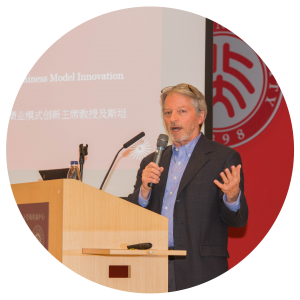event
Blurring of the Boundaries – China 2017

March 21st, 2017
Stanford PACS held its 6th annual conference at the Stanford Center at Peking University (SCPKU) in Beijing, China on March 21 & 22, 2017. The two-day event brought together scholars and social sector practitioners from Asia, Europe, and the US, to exchange ideas, and engage in an immersive learning experience on emerging and proven trends and practices in philanthropy and social innovation. The conference was organized with the generous support of the Leping Foundation.
On March 21st, Stanford PACS Faculty Co-Director Paul Brest moderated a panel discussion on “Strategies and Structures for Social Impact in China”. Panelists included Professor Weiying Zhang, from Peking University’s National School of Development. As a preeminent economist in China, Professor Zhang brought a unique and important perspective on opening markets in China for social enterprises, while Marcello Palazzi, Founder and Board Member of B Lab Europe brought a philanthropreneur’s viewpoint on balancing social mission and financial returns. Jaff Shan, President of the Leping Foundation, provided an interesting bridge to these outlooks by sharing insights on the Chinese experience in this context. The interesting juxtaposition of scholarly and practitioner perspectives within the framework of adapting global trends to the Chinese context succeeded in engaging the audience in a provocative and informative dialogue.
The second half of March 21st saw Stanford PACS Fellow Christian Seelos deliver an inspiring keynote on how innovation and scaling can create impact for social enterprises. Christian drew from his years of research on this subject and presented pertinent examples of scaling and innovation that resonated with the predominantly Asian nonprofit and foundation leaders in the audience. The remarks were followed by a panel discussion on “Asian Experiences: Case Studies in Social Enterprise Innovation” where Christian engaged Wenfeng Wei, Founder and CEO of Daddy Lab and Maria May, Head, Executive Director’s Office, BRAC in a riveting conversation about social innovation in Bangladesh and China. Christian’s scholarly work provided a useful underpinning for the two practitioners to share their practical experience. Thanks to Daddy Lab’s immense popularity, WeChat was buzzing with highlights from the session!
The day concluded with the launch of Stanford Social Innovation Review’s East Asia Supplement and the public announcement of a formal partnership between SSIR and Leping to publish the Chinese version of SSIR.
On March 22nd, Paul Brest, Christian Seelos and Marcello Palazzi each led a half day immersive workshop on Impact Investing, Innovation and Scaling for Impact, and B Corporations, respectively. The workshop participants included nonprofit leaders, social entrepreneurs and graduate students interested in learning from experts in these topics. The interest and deep level of engagement in each of the workshops highlighted the growing appetite for quality content and educational opportunities in the social sector in China.
This year, the annual conference was complemented by the Digital Impact World Tour day on March 23rd, organized in partnership with the Ai You Foundation. The daylong event was led by Lucy Bernholz, Stanford PACS Senior Scholar and Director of the Digital Civil Society Lab and her co-host, Andrew Means, Head of beyond.uptake and co-founder of The Impact Lab. Beijing is one of 12 cities around the world that will serve as tour stops. Through the Digital Impact World Tour, the Lab seeks to learn from leaders of nonprofits and foundations, individual funders, and advocacy groups about how they may be aligning their use of digital resources with their unique values. At SCPKU, Lucy and Andrew led workshops on such pertinent topics as nonprofit data responsibility and the tactical challenges associated with using digital data to achieve mission. Jessica Geng, Secretary General of the Ai You Foundation delivered opening keynote remarks and Tao Ze, President of China Foundation Center shared his perspective on building a sector powered by information in China. Both of these remarks added an important local dimension to these global topics.
Each of the three days saw 120+ participants, primarily from China, but also from other parts of Asia. It is the largest audience hosted by Stanford PACS at SCPKU and speaks to our growing relevance as a key knowledge partner to social entrepreneurs and philanthropists in China.
